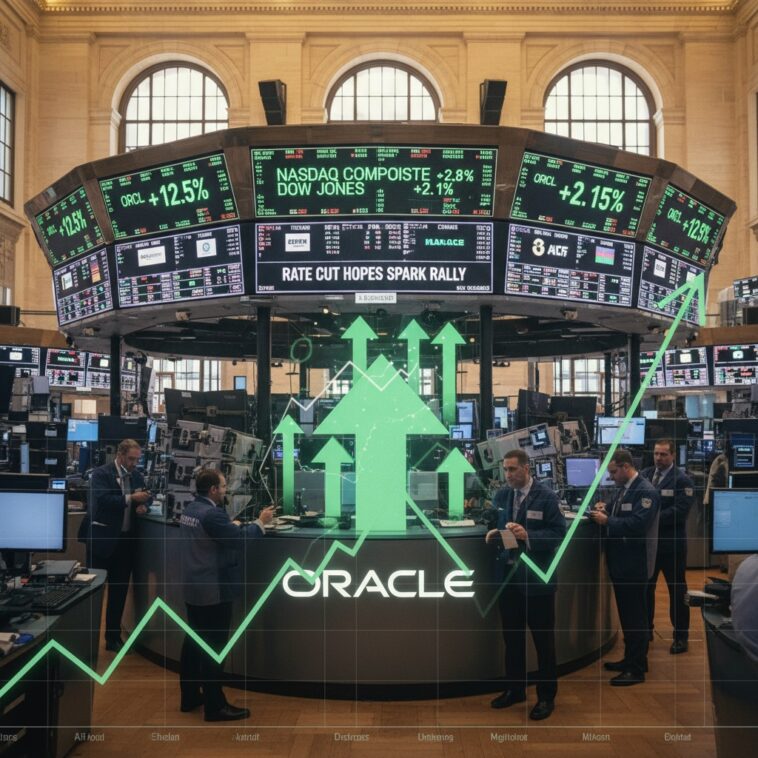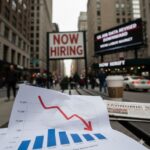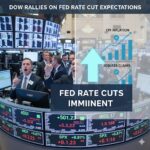A remarkable forecast from software giant Oracle (ORCL) gave a serious boost to tech stocks on Wednesday, pushing the S&P 500 and Nasdaq to new heights, thanks to a positive inflation report that strengthened the argument for a Federal Reserve rate cut.
In afternoon trading, the S&P 500 (^GSPC) and the tech-heavy Nasdaq Composite (^IXIC) both rose about 0.5%, wrapping up a day filled with broad gains. On the flip side, the Dow Jones Industrial Average (^DJI), which features fewer tech favorites, fell behind with a 0.3% drop. It was a classic case of two markets in action—one riding the AI wave, while the other, not so much.
The Oracle Effect
The spotlight of the day was undoubtedly on Oracle. Its shares soared over 30% after CEO Larry Ellison shared with investors that the company’s cloud revenue is set to skyrocket, thanks to a wave of bookings from the “who’s who of AI.” This surge in stock price came even after an earnings report that fell short of quarterly expectations. It’s a surprising, yet not entirely uncommon, reaction from the market. The underlying optimism seems to rest on a straightforward notion: the extensive build-out of AI infrastructure is finally gaining momentum, and Oracle is in a prime position to grab a significant portion of that opportunity.
“We’re witnessing investors looking beyond a lackluster quarter and zeroing in on the enormous potential ahead,” explained Jessica Miller, a senior analyst at Capital Research Group. “Ellison’s remarks provided the market with the reassurance it had been waiting for. This represents a fundamental shift that prompts people to reconsider the entire trajectory of a company.”
Wholesale Inflation Cools, Bolstering Fed’s Case
The rally wasn’t just focused on one stock; it got a boost from some much-needed good news regarding inflation. A key indicator of wholesale prices—the Producer Price Index (PPI)—came in lower than what many had anticipated. In fact, the index actually dropped month-over-month, surprising economists who had expected a 0.3% increase. On a year-over-year basis, the index only rose by 2.6%, which is significantly below the anticipated 3.3%.
This information is crucial as it provides the last piece of the inflation puzzle ahead of the Fed’s policy meeting next week. A revision to US job numbers released on Tuesday already hinted at a weakening labor market. Together, these reports have solidified the market’s belief that the central bank is likely to lower interest rates in September.
It’s quite the balancing act. For months, the Fed has been navigating between a robust economy and persistent inflation. But now, it seems the data is finally coming together, giving policymakers the justification they need to take action. Meanwhile, the market is already in celebration mode.
Global Tensions and Corporate Winners
While economic data and earnings have been stealing the spotlight, there’s a subtle undercurrent of geopolitical tensions simmering beneath the surface. Reports have emerged that President Donald Trump is pushing the European Union to team up with the US for a new wave of 100% tariffs on India and China. This bold trade strategy seems aimed at nudging Russia to come to the table regarding the Ukraine conflict. It serves as a reminder that even when the markets are thriving, the global chess game is always in play, and fresh challenges can pop up from the most unexpected places.
In other corporate news, GameStop (GME) shares took a leap after the video game retailer announced a 20% increase in quarterly revenue. The stock, a long-time darling of meme-stock enthusiasts, experienced a flash of its classic volatility. It was a quintessential GameStop moment, showing that some aspects of the market remain unchanged.
Looking at the bigger picture, all eyes are now on the Fed. With inflation appearing to cool off and a crucial segment of the economy—the labor market—showing signs of slowing, the road to a rate cut seems pretty clear. The real question isn’t whether they’ll cut rates, but rather how the market will respond after a week fueled by pure optimism.



